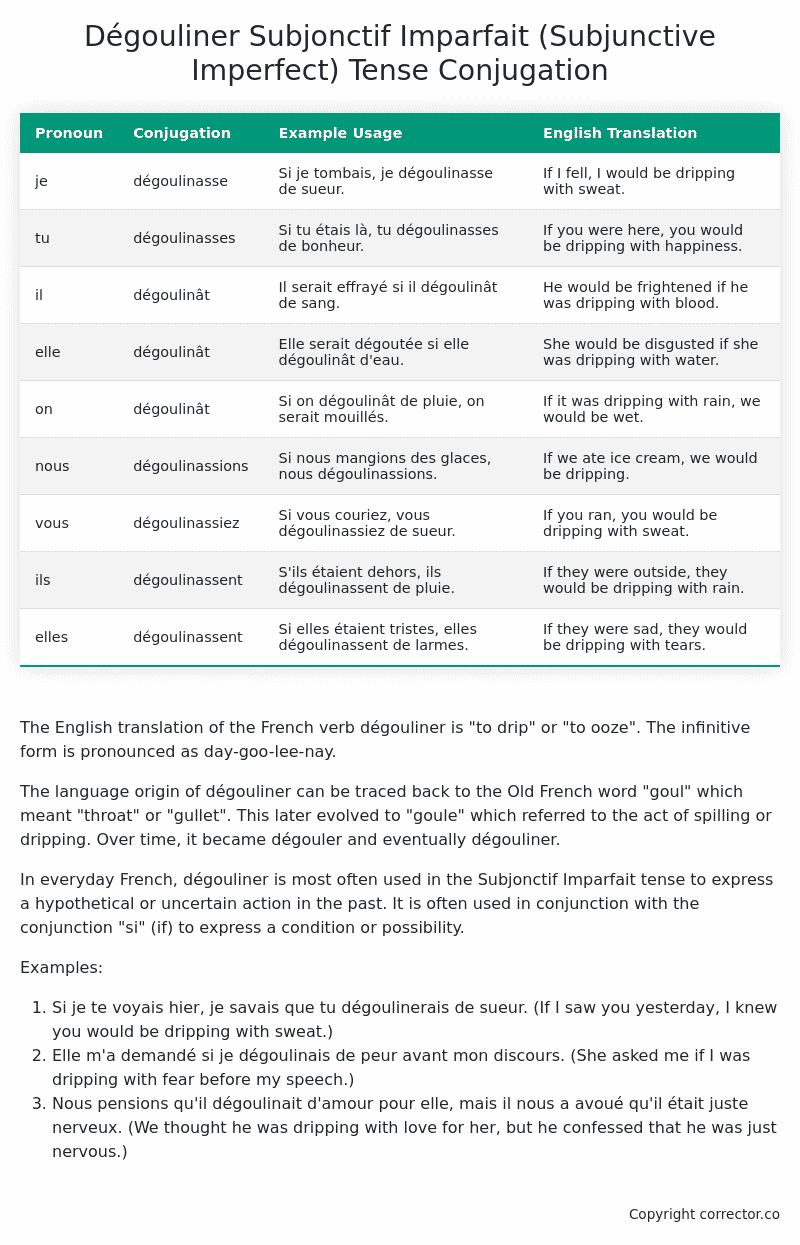Subjonctif Imparfait (Subjunctive Imperfect) Tense Conjugation of the French Verb dégouliner
Introduction to the verb dégouliner
The English translation of the French verb dégouliner is “to drip” or “to ooze”. The infinitive form is pronounced as day-goo-lee-nay.
The language origin of dégouliner can be traced back to the Old French word “goul” which meant “throat” or “gullet”. This later evolved to “goule” which referred to the act of spilling or dripping. Over time, it became dégouler and eventually dégouliner.
In everyday French, dégouliner is most often used in the Subjonctif Imparfait tense to express a hypothetical or uncertain action in the past. It is often used in conjunction with the conjunction “si” (if) to express a condition or possibility.
Examples:
- Si je te voyais hier, je savais que tu dégoulinerais de sueur. (If I saw you yesterday, I knew you would be dripping with sweat.)
- Elle m’a demandé si je dégoulinais de peur avant mon discours. (She asked me if I was dripping with fear before my speech.)
- Nous pensions qu’il dégoulinait d’amour pour elle, mais il nous a avoué qu’il était juste nerveux. (We thought he was dripping with love for her, but he confessed that he was just nervous.)
Table of the Subjonctif Imparfait (Subjunctive Imperfect) Tense Conjugation of dégouliner
| Pronoun | Conjugation | Example Usage | English Translation |
|---|---|---|---|
| je | dégoulinasse | Si je tombais, je dégoulinasse de sueur. | If I fell, I would be dripping with sweat. |
| tu | dégoulinasses | Si tu étais là, tu dégoulinasses de bonheur. | If you were here, you would be dripping with happiness. |
| il | dégoulinât | Il serait effrayé si il dégoulinât de sang. | He would be frightened if he was dripping with blood. |
| elle | dégoulinât | Elle serait dégoutée si elle dégoulinât d’eau. | She would be disgusted if she was dripping with water. |
| on | dégoulinât | Si on dégoulinât de pluie, on serait mouillés. | If it was dripping with rain, we would be wet. |
| nous | dégoulinassions | Si nous mangions des glaces, nous dégoulinassions. | If we ate ice cream, we would be dripping. |
| vous | dégoulinassiez | Si vous couriez, vous dégoulinassiez de sueur. | If you ran, you would be dripping with sweat. |
| ils | dégoulinassent | S’ils étaient dehors, ils dégoulinassent de pluie. | If they were outside, they would be dripping with rain. |
| elles | dégoulinassent | Si elles étaient tristes, elles dégoulinassent de larmes. | If they were sad, they would be dripping with tears. |
Other Conjugations for Dégouliner.
Le Present (Present Tense) Conjugation of the French Verb dégouliner
Imparfait (Imperfect) Tense Conjugation of the French Verb dégouliner
Passé Simple (Simple Past) Tense Conjugation of the French Verb dégouliner
Passé Composé (Present Perfect) Tense Conjugation of the French Verb dégouliner
Futur Simple (Simple Future) Tense Conjugation of the French Verb dégouliner
Futur Proche (Near Future) Tense Conjugation of the French Verb dégouliner
Plus-que-parfait (Pluperfect) Tense Conjugation of the French Verb dégouliner
Passé Antérieur (Past Anterior) Tense Conjugation of the French Verb dégouliner
Futur Antérieur (Future Anterior) Tense Conjugation of the French Verb dégouliner
Subjonctif Présent (Subjunctive Present) Tense Conjugation of the French Verb dégouliner
Subjonctif Passé (Subjunctive Past) Tense Conjugation of the French Verb dégouliner
Subjonctif Imparfait (Subjunctive Imperfect) Tense Conjugation of the French Verb dégouliner (this article)
Subjonctif Plus-que-parfait (Subjunctive Pluperfect) Tense Conjugation of the French Verb dégouliner
Conditionnel Présent (Conditional Present) Tense Conjugation of the French Verb dégouliner
Conditionnel Passé (Conditional Past) Tense Conjugation of the French Verb dégouliner
L’impératif Présent (Imperative Present) Tense Conjugation of the French Verb dégouliner
L’infinitif Présent (Infinitive Present) Tense Conjugation of the French Verb dégouliner
Struggling with French verbs or the language in general? Why not use our free French Grammar Checker – no registration required!
Get a FREE Download Study Sheet of this Conjugation 🔥
Simply right click the image below, click “save image” and get your free reference for the dégouliner Subjonctif Imparfait tense conjugation!

Dégouliner – About the French Subjonctif Imparfait (Subjunctive Imperfect) Tense
Formation
Common Everyday Usage Patterns
Interactions with Other Tenses
Subjonctif Présent
Indicatif Passé Composé
Conditional
Conditional Perfect
Summary
I hope you enjoyed this article on the verb dégouliner. Still in a learning mood? Check out another TOTALLY random French verb conjugation!


